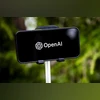OpenAI co-founder and chief scientist Ilya Sutskever is leaving the startup at the center of today's artificial intelligence boom.
"OpenAI would not be what it is without him," OpenAI CEO Sam Altman wrote in a message to the company, which OpenAI posted on its blog.
Microsoft-backed OpenAI makes the popular ChatGPT chatbot, which sparked a race among the world's largest tech companies for dominance in the emerging generative AI field.
Jakub Pachocki will be the company's new chief scientist, the company said on its blog.
Pachocki has previously served as OpenAI's director of research and led the development of GPT-4 and OpenAI Five.
Also Read
"After almost a decade, I have made the decision to leave OpenAI," Sutskever said in a post on X.
Sutskever posted that he is working on a new project "that is very personally meaningful to me about which I will share details in due time."
Sutskever played a key role in Altman's dramatic firing and rehiring in November last year. At the time, Sutskever was on the board of OpenAI and helped to orchestrate Altman's firing.
Days later, he reversed course, signing onto an employee letter demanding Altman's return and expressing regret for his "participation in the board's actions."
After Altman returned, Sutskever was removed from the board and his position at the company became unclear.
Sutskever's exit comes a day after the company said at an event on Monday that it would release a new AI model called GPT-4o, capable of realistic voice conversation and able to interact across texts and images.
Shortly after launching in late 2022, ChatGPT was called the fastest application ever to reach 100 million monthly active users. However, worldwide traffic to ChatGPT's website has been on a roller-coaster ride in the past year and is only now returning to its May 2023 peak, according to analytics firm Similarweb.
Sutskever has long been a prominent researcher in the AI field. Before founding OpenAI, he worked as a researcher at Google Brain, and was a postdoctoral researcher at Stanford, according to his personal website. He started his career working with Geoffrey Hinton, one of the so-called "godfathers of AI".
(Only the headline and picture of this report may have been reworked by the Business Standard staff; the rest of the content is auto-generated from a syndicated feed.)

)
